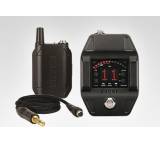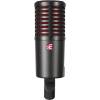Beliebte Filter: Anschluss
737 Ergebnisse entsprechen den Suchkriterien
-
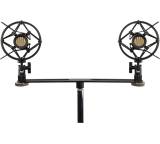
Sehr gut
1,0
SE Electronics sE5 Stereo-Set
- Typ: Instrumentenmikrofon
- Technologie: Kondensator
- Richtcharakteristik: Niere
Zum Produkt
-

Gut
1,6
MicW iGoMic Mini Shotgun
- Typ: Kamera-Mikrofon, Richtmikrofon
- Technologie: Elektret, Kondensator
- Richtcharakteristik: Superniere
Zum Produkt
-

Sehr gut
1,5
Lewitt LCT 450
- Typ: Instrumentenmikrofon, Gesangsmikrofon
- Technologie: Kondensator
- Richtcharakteristik: Niere
Zum Produkt
-

Sehr gut
1,5
Sony ECM-CG50
- Typ: Kamera-Mikrofon
- Technologie: Elektret, Kondensator
- Richtcharakteristik: Hyperniere
Zum Produkt
-
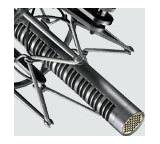
ohne Endnote
Neumann KMR 81 i
- Typ: Richtmikrofon
- Technologie: Röhre
- Richtcharakteristik: Superniere, Direktional (Keule)
Zum Produkt
-

Sehr gut
1,0
DPA Microphones d:fine In-Ear (Dual Ear Mount, Single In-Ear)
- Typ: Gesangsmikrofon
- Technologie: Kondensator
- Richtcharakteristik: Niere, Omnidirektional (Kugel)
Zum Produkt
-

Sehr gut
1,0
Lewitt LCT 550
- Typ: Instrumentenmikrofon, Gesangsmikrofon
- Technologie: Kondensator
- Richtcharakteristik: Niere
Zum Produkt
-

Gut
2,0
SE Electronics sE 2200a II C
- Typ: Instrumentenmikrofon, Gesangsmikrofon
- Technologie: Kondensator
- Richtcharakteristik: Niere
Zum Produkt
-
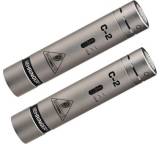
Sehr gut
1,5
Behringer C-2 Stereo-Set
- Technologie: Kondensator
- Richtcharakteristik: Stereo, Niere
Zum Produkt
-

ohne Endnote
Azden SGM990+i
- Typ: Kamera-Mikrofon, Richtmikrofon
- Technologie: Elektret, Kondensator
- Richtcharakteristik: Direktional (Keule), Niere
Zum Produkt
-

Gut
2,0
Sontronics Halo
- Typ: Instrumentenmikrofon
- Technologie: Dynamisch
- Richtcharakteristik: Niere
Zum Produkt
-

Gut
2,0
Prodipe STC-3D Ludovic Lanen
- Typ: Instrumentenmikrofon, Gesangsmikrofon
- Technologie: Kondensator
- Richtcharakteristik: Bidirektional (Acht), Direktional (Keule), Omnidirektional (Kugel)
Zum Produkt
-

Sehr gut
1,0
Violet Design Amethyst Vintage
- Typ: Instrumentenmikrofon, Gesangsmikrofon
- Technologie: Kondensator
- Anschluss: XLR
Zum Produkt
-

Gut
2,0
Sony ECM-W1M
- Typ: Kamera-Mikrofon, Funkmikrofon
- Technologie: Elektret, Kondensator
Zum Produkt
-

Gut
2,0
Samson CL2
- Typ: Instrumentenmikrofon, Gesangsmikrofon
- Technologie: Kondensator
- Richtcharakteristik: Niere, Omnidirektional (Kugel)
Zum Produkt
-

Gut
2,0
Mojave Audio MA-301fet
- Typ: Instrumentenmikrofon, Gesangsmikrofon
- Technologie: Kondensator
- Richtcharakteristik: Bidirektional (Acht), Niere, Omnidirektional (Kugel)
Zum Produkt
-
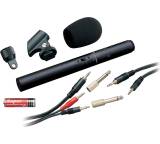
Gut
2,4
Audio-Technica ATR6250
- Typ: Kamera-Mikrofon
- Technologie: Kondensator
- Richtcharakteristik: Stereo, Bidirektional (Acht)
Zum Produkt
-

Sehr gut
1,0
Shure QLX-D24
- Typ: Funkmikrofon, Reportermikrofon, Instrumentenmikrofon, Gesangsmikrofon
- Technologie: Kondensator
- Richtcharakteristik: Superniere, Niere
Zum Produkt
-
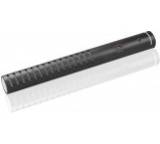
Sehr gut
1,4
Beyerdynamic MCE 85 PV
- Typ: Kamera-Mikrofon, Richtmikrofon
- Technologie: Elektret, Kondensator
- Richtcharakteristik: Superniere, Direktional (Keule)
Zum Produkt
-
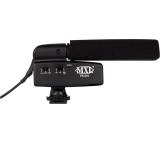
Sehr gut
1,4
MXL Mikrofone FR-310 (mit Smartphone-Halterung MM-VE 001)
- Typ: Kamera-Mikrofon, Richtmikrofon
- Technologie: Elektret, Kondensator
- Richtcharakteristik: Superniere
Zum Produkt
-

Sehr gut
1,0
Line6 XD-V55
- Typ: Funkmikrofon, Tischmikrofon, Gesangsmikrofon
- Technologie: Dynamisch
- Richtcharakteristik: Niere
Zum Produkt
-

Sehr gut
1,0
MXL Mikrofone 860
- Typ: Gesangsmikrofon
- Technologie: Bändchen
- Richtcharakteristik: Bidirektional (Acht)
Zum Produkt
-

Gut
2,3
MicW iGo Mic
- Technologie: Elektret, Kondensator
- Richtcharakteristik: Stereo, Niere
- Anschluss: Klinke (3,5 mm)
Zum Produkt
-

ohne Endnote
Thomann The t.Bone CC100
- Typ: Instrumentenmikrofon
- Technologie: Kondensator
- Richtcharakteristik: Niere
Zum Produkt
-

Sehr gut
1,5
Royer Labs R-121 Platinum
- Typ: Instrumentenmikrofon, Gesangsmikrofon
- Technologie: Bändchen
- Richtcharakteristik: Bidirektional (Acht)
Zum Produkt
-

Gut
2,0
Lewitt LCT 540
- Typ: Instrumentenmikrofon
- Technologie: Kondensator
- Richtcharakteristik: Niere
Zum Produkt
-

ohne Endnote
Miktek Audio PM5
- Typ: Instrumentenmikrofon, Gesangsmikrofon
- Technologie: Kondensator
- Richtcharakteristik: Niere
Zum Produkt
-

Befriedigend
2,9
Thomann T.Bone CM Quad
- Typ: Kamera-Mikrofon, Ansteckmikrofon
- Technologie: Kondensator
- Richtcharakteristik: Stereo, Omnidirektional (Kugel)
Zum Produkt
-

Sehr gut
1,2
Azden SMX-30
- Typ: Kamera-Mikrofon, Richtmikrofon
- Technologie: Elektret, Kondensator
- Richtcharakteristik: Stereo, Superniere, Niere
Zum Produkt
-

Sehr gut
1,5
Oktava MK-102
- Typ: Instrumentenmikrofon
- Technologie: Kondensator
- Anschluss: XLR
Zum Produkt








